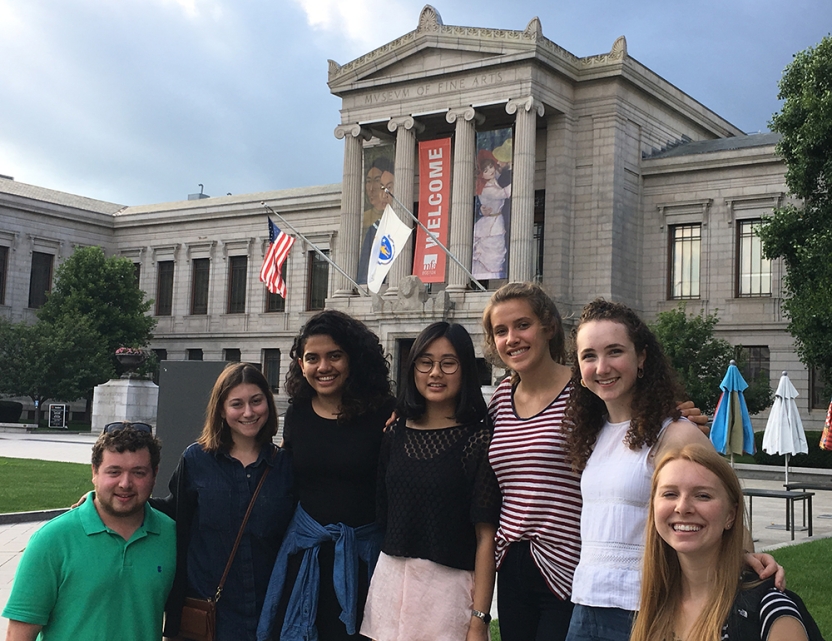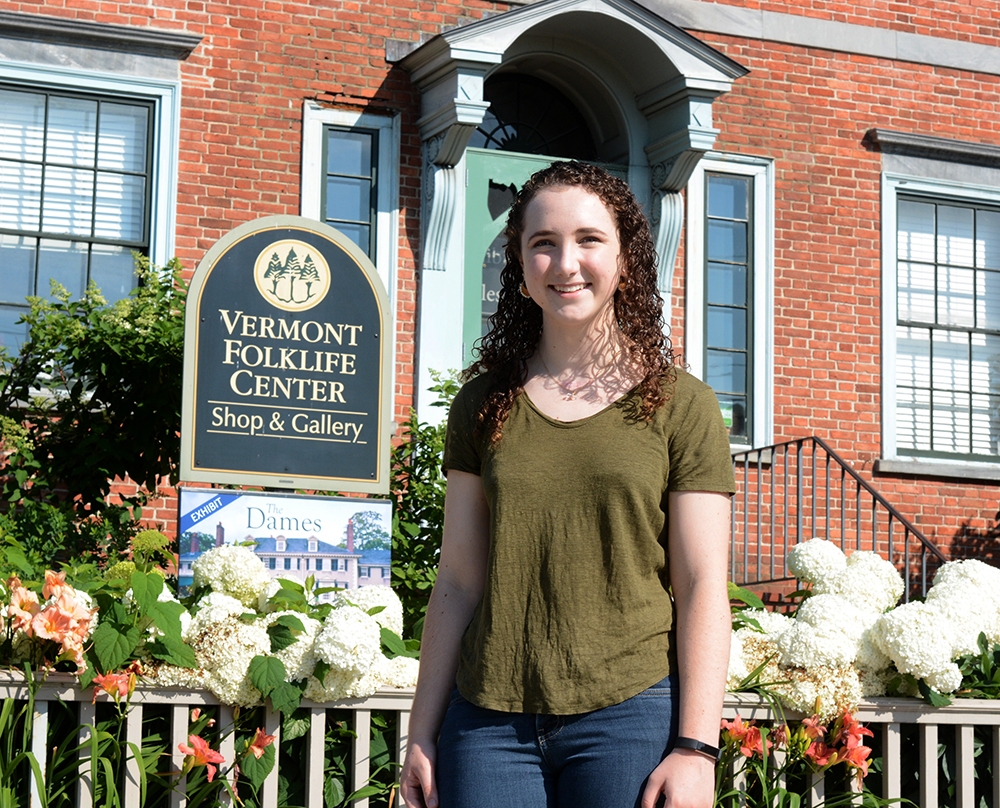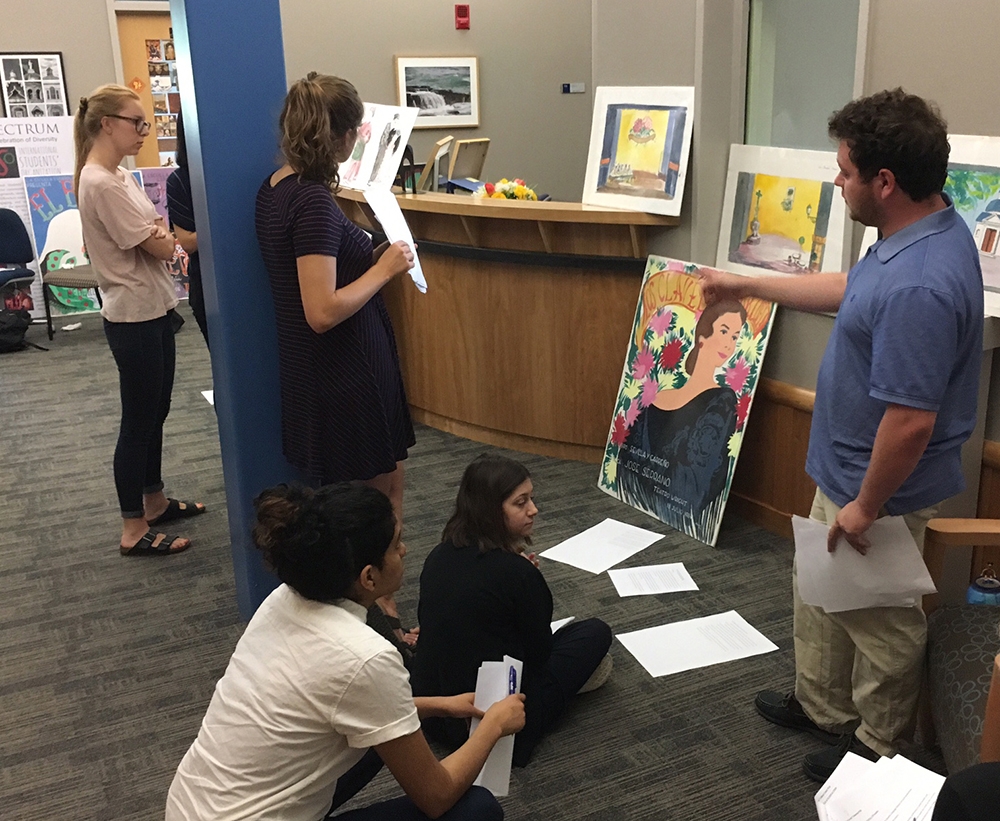‘Cohort Internships’ Lead to Deeper Learning, Greater Engagement

MIDDLEBURY, Vt. – Everyone knows the formula for deriving benefit from an internship: show up on time, ask questions, volunteer for projects, and act professionally. Recently, Middlebury College has added a new element to enhance its students’ likelihood of attaining internship success: share the experience with your peers.
Informally called “cohort internships,” Middlebury’s Center for Careers and Internships (CCI) is now offering a number of programs that empower teams of students to pursue their professional goals together.
“Our assessments have shown that students inevitably get more out of their cohort internships than they get from solo internships,” said Amy Gibans McGlashan, director of academic outreach and special projects at CCI.
“Cohort internship programs intentionally combine several well-accepted ‘high-impact practices’ that result in deeper learning and greater engagement. In addition to gaining real-world experience and developing professional competencies,” McGlashan added, “students in cohort programs are exposed to more content, participate in more and varied experiences, gain diverse perspectives, and connect more ideas and concepts.”
Seven Middlebury undergraduates, including art-history major Juliana Dunn of Houston, Texas, are serving as MuseumWorks interns this summer. Dunn ‘19 is working at the Vermont Folklife Center while her peers are tackling their own projects at the Middlebury College Museum of Art, the Armstrong Science Library, and the Henry Sheldon Museum of Vermont History.
The seven students all live in close proximity to each other, share their daily work experiences, and go on “5th day” excursions each week. (So far, they’ve gone together to art museums, historic homes, living museums, a conservation lab, art galleries, archives, and history museums.) The interns are also curating their own exhibition in honor of this year’s Spanish School Centennial; they are mounting a show of hand-painted posters and watercolors by the late artist Alfredo Ramón, who taught in the school for many years.

Dunn, the Folklife Center intern, is reimagining one of the center’s recent projects called “The Golden Cage” – a revealing portrait of Vermont’s Mexican farm workers – with the goal of making it more accessible to all Vermonters. (Since many of audio interviews were conducted in Spanish, Dunn and a friend are translating the material into English.) She wants to convey the migrant workers’ sense of impermanence, show that their community extends beyond the farms, and present the workers “in a way they would want to be presented.” Meanwhile she also adapted the exhibit so it could travel to Washington where it is now on display in U.S. Senator Bernie Sanders’ office.
The cohort philosophy of MuseumWorks has added benefit to the internship experience, Dunn explains. “There is a lot of cross-fertilization of knowledge among the students in our group. Not all of us are history majors, and seeing each other’s different skill sets has been exciting. I learned how to use AutoCAD [design software] from an architectural-studies major in our group. We are all doing our own independent projects at work, but we also get to work together on the Alfredo Ramón exhibition, so it’s like getting the best of both worlds!” she said.
Now in its third summer, the eight-week MuseumWorks program is codirected by Emmie Donadio, the museum’s curator of modern and contemporary art, and Jason Vrooman ’03, curator of education and academic programs
“It is amazing to see how the students are teaching each other and learning from each other almost as much as they are from the established professionals in the field,” said Vrooman. “And along the way they are learning about group dynamics, teamwork, and when to compromise and when to hold your ground.”

With MuseumWorks, the students are gaining professional experience at the same time they are witnessing the vital role that cultural institutions play in their communities, Vrooman added. “We see that our [cohort] internship has more advantages than a traditional internship experience,” he said. “MuseumWorks gives students the raw materials to work with, and then they have to do the thinking and problem-solving on their own.”
Other cohort internships offered at Middlebury include Vermont FoodWorks; Ambassador Corps; Global Health Works; Privilege & Poverty Interns; and CLIMB, a Denver-area internship program offered in cooperation with Yale, MIT, and six other institutions.
Charlie Mitchell ’18, from Beverly, Mass., did the Vermont FoodWorks internship after his first year at Middlebury and recalled, “I lived that summer in Weybridge House with other FoodWorks kids and the Organic Farm interns, and it was an awesome community to be part of. We bounced around our ideas about food and had great conversations. We were all together over our common interest in food, and the 5th day field trips were bonding experiences for us.”
FoodWorks gave Mitchell “a different lens on academia” because, he said, “the research I did and the learning that took place was more applied and ‘real world’ in that sense. It helped me bring a more creative project-based approach to my academics once the school year started again.”
Mitchell is a leader in the student organization Middlebury Foods, which provides wholesome food at affordable prices to Vermont residents, and says many of the contacts he developed during his FoodWorks summer are part of his Middlebury Foods network today.
Cohort internships strive to deepen students’ learning and growth by combining professional experience, career development, and academic content into a single program, said Amy McGlashan at the Center for Careers and Internships. “Cohort learning experiences add greater value as students develop personal and professional skills and dispositions, cultural competencies, and content knowledge that further prepares them for life and careers.”

